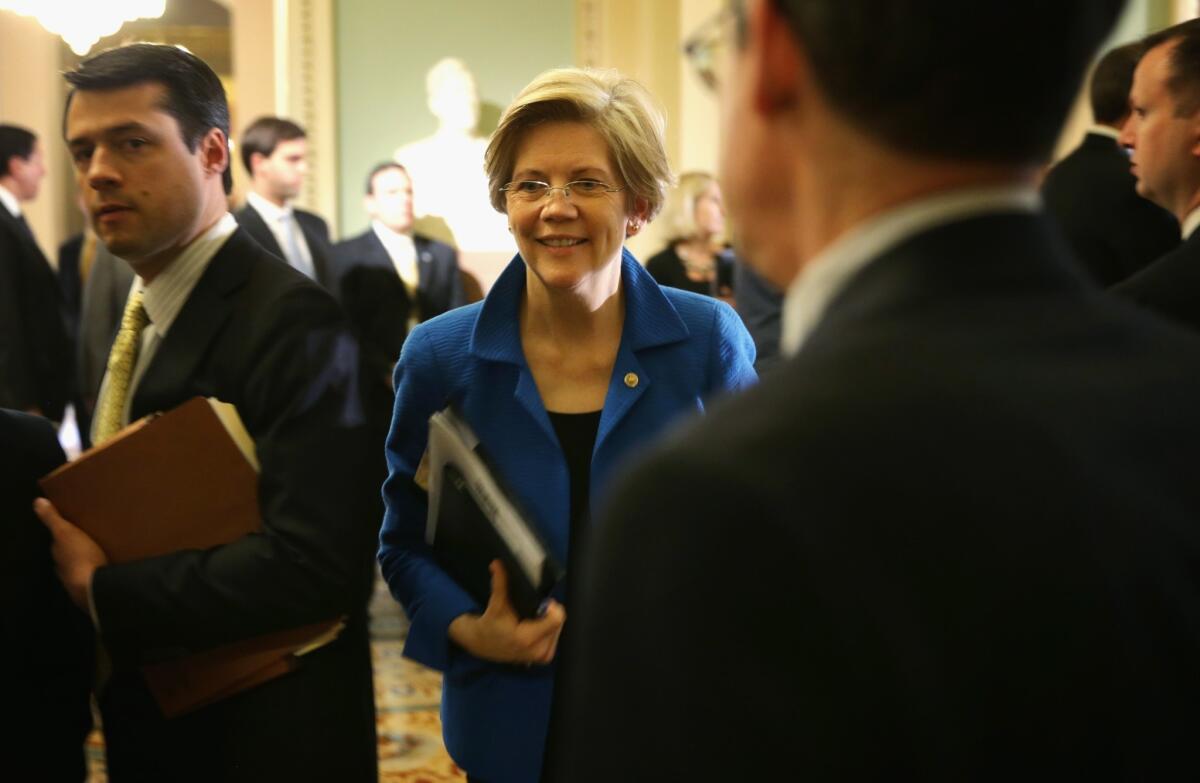Will Elizabeth Warren run?

Sen. Elizabeth Warren (D-Mass.), center, walks towards the Senate Chamber after a policy luncheon on Capitol Hill.
- Share via
In her recently published memoir, Sen. Elizabeth Warren (D-Mass.) relays a chilling anecdote about how Washington really works. In 2009, she was running a congressional panel to oversee the Treasury Department’s bailout of the financial industry, and the new Obama administration was unhappy that she was being as tough on them as she had been on its Republican predecessors. So the president’s top economic advisor, Lawrence H. Summers, took Warren out for a friendly dinner.
“Late in the evening, Larry leaned back in his chair and offered me some advice,” Warren writes. “I had a choice. I could be an insider or I could be an outsider. Outsiders can say whatever they want. But people on the inside don’t listen to them. Insiders, however, get lots of access…. But insiders also understand one unbreakable rule: They don’t criticize other insiders.”
Warren decided to remain an outsider and went right on flaying then-Treasury Secretary Timothy Geithner for failing to help distressed homeowners while he was rescuing big banks. When President Obama decided against nominating Warren to run the new Consumer Finance Protection Bureau, she ran for the Senate instead. And last year, from that seat, she was one of several senators who helped kill Summers’ likely nomination as chairman of the Federal Reserve.
“The game is rigged,” she said last week in one of the many television interviews she’s done on her book tour. “The CEOs of the largest financial institutions still strut around Washington. Those big banks … break the law and nobody goes to jail. That’s not a level playing field. That’s not a fair system.”
She’s smart, eloquent, liberal and fiery. Her ferocity as a critic of Wall Street has made her a heroine to the Democratic left. A potential presidential candidate?
“I am not running for president,” she says over and over.
“No, no, no, no, no,” she told the Boston Globe.
To avoid stirring any speculation, an aide said, she’s not setting foot in New Hampshire, not even to campaign for her colleague Sen. Jeanne Shaheen (D-N.H.) only 45 minutes from her home in Massachusetts.
Of course, plenty of candidates have said they aren’t running two years before the election, only to undergo a change of heart later on — Barack Obama among them. But people who know Warren say they take her at her word. Her chief fundraiser has reportedly told donors to forget it; she isn’t running.
And she isn’t doing some of the things a potential presidential candidate normally does. Her book reads like a campaign autobiography, but it’s focused almost entirely on her crusade to rein in the big financial institutions; there’s nothing in it about any of the other major issues a presidential candidate is expected to have thought about. She didn’t ask for a seat on the Senate Foreign Relations Committee, a useful stop for legislators who want to acquire international credentials (as Obama found).
Instead, she’s doing what most freshman senators do. She’s proposing bills on her favorite issues — this week, one that would allow holders of student loans to refinance at lower interest rates; before that, one to require federal financial agencies to disclose more information about financial settlements.
She’s trying to strike alliances with Republicans, a useful skill in a closely divided Senate; her cosponsors on bills have included GOP Sens. John McCain of Arizona, Marco Rubio of Florida and Orrin G. Hatch of Utah.
And she’s trying to revive a somewhat disused congressional tool — oversight hearings — to nudge or, in her case, shove regulators toward tougher enforcement of existing laws.
“They clearly have not been doing their jobs,” she said. “There’s a lot of law out there already. The key … is getting the regulators to pick up the law and use it.”
Warren can already claim some results. After she publicly questioned the Securities and Exchange Commission’s policy of allowing financial institutions to settle cases without admitting guilt, the SEC announced that it was changing the practice. After Warren questioned the way the Federal Reserve decided on enforcement actions, Fed Chairwoman Janet L. Yellen announced that the Fed would amend its procedures.
And although Warren criticized Hillary Rodham Clinton in a previous book for her vote in favor of a 2001 bill that would have made it harder for ordinary people to declare bankruptcy, she’s now saying nice things about the woman most likely to become her party’s next presidential nominee. When interviewers ask how she feels about Clinton, Warren invariably replies: “Hillary’s terrific.”
Could it be that Elizabeth Warren, the ultimate outsider, has decided to play the inside game too?
If Clinton runs for president and wins, Warren can logically be expected to do her best to pull the new administration in her direction — and a few friendly noises now, when the candidate needs them, could pay big dividends then.
And if Clinton opts not to run for president, her supporters will be looking for a new champion — perhaps a dynamic liberal woman who hasn’t been too tough on Hillary.
More to Read
A cure for the common opinion
Get thought-provoking perspectives with our weekly newsletter.
You may occasionally receive promotional content from the Los Angeles Times.










